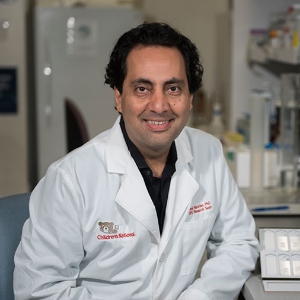Research And Grants

Children's National Medical Center - $99,979
Dr. Javad Nazarian
$99,979.00
November 2013
Translational
DIPG
Comparative Proteomic and RNA Sequencing of DIPGs
Scientific Merit: Pediatric diffuse intrinsic pontine gliomas (DIPGs) are high-grade cancers of the brainstem that are rarely biopsied due to the morbidity of the procedure. Recent advances in the understanding of DIPG biology include the discovery of a mutation in the gene coding for histone 3.3 (H3.3K27M). However, the exact molecular mechanism of the H3 mutation that leads to tumor formation is not understood.
One of the major obstacles in understanding the biology of DIPGs is the lack of tissue for molecular studies. In this proposal, we aim to share resources (specimens, data, and expertise) between the Children’s Research Institute (CRI) in Washington DC, and the Hospital for Sick Children (SickKids) in Toronto, Canada to study the transcriptome and proteome of DIPGs. Two Aims are proposed: AIM1. To map protein expression patterns of DIPG subtypes based on H3 K27 mutation status and activation of SHH/Myc pathways using our DIPG Protein Atlas and SILAC-based targeted proteomics. AIM2. To generate comprehensive transcriptomic data using RNA-seq for our DIPG cohort and integrate with matching proteomic data.
Disease Impact: We propose to generate targeted proteomics and RNA sequencing of DIPG specimens. The immediate outcomes of the proposed project will be: i) the identification of genomic mutations, deletion, amplification and fusion. We will further validate fusion proteins by comparative analysis of proteomics and mRNA data ii) identification of DIPG subtypes based on their histone 3 mutation and further mapping of SHH and Myc pathways in DIPG subtypes. Generation and comparative analysis of DIPG transcriptome and proteome will have immediate impact on disease by providing new avenues for developing targeted treatments.
Innovation: The proposed project will be the first study to investigate targeted proteome and transcriptome of DIPGs. CRI has generated preliminary data indicating molecular subtypes of DIPGs as well as their molecular subtypes with regards to histone 3 mutations. This proposal will use a novel Human DIPG Proteome Atlas to perform targeted proteomics, where proteins involved in each pathway will be mapped using mass spectrometry technique. Moreover, because DIPG samples will be spiked with DIPG Proteome Atlas, we will be able to generate absolute quantification of expressed proteins. Furthermore, RNA-seq will generate the opportunity to discover genomic deletion, mutation and amplification. Comparative analysis with proteome data will enable us to detect expressed fusion proteins in DIPGs and explore their role in tumor formation using targeted proteomics. As such, this is a highly innovative proposal that will foster collaboration and expand our understanding of DIPG biology.
Feasibility: CRI and SickKids have shared all frozen specimens and both institutions are capable of carrying the planned experiments as outlined in the proposal. CRI has generated protein profiling of DIPGs and has identified pathways for further analysis using targeted proteomics. SickKids is well equipped with carrying the RNA sequencing Aim. As such, the proposed project is highly feasible and we predict no difficulties with performing the proposed Aims.
Expertise: Dr. Nazarian (PI) at Children’s Research Institute has led efforts in studying the protein profiling of DIPGs. CRI has a state-of-the art Proteomic Core housing a recently purchased QExactive mass spectrometer capable of performing high resolution quantitative and targeted proteomics. CRI has also generated preliminary proteomics data and has identified target pathways which will be further investigated using targeted proteomics. Dr. Hawkins (Co-PI) at Hospital for Sick Children (SickKids) is an expert in pathology and studying the molecular basis of pediatric brain tumors. The Centre for Applied Genomics at SickKids is a pioneering center in generating genomic profile of pediatric brain tumors. This center houses an Illumina HISeq 2500 platform which will be used for the proposed study.

